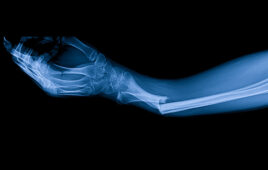Artificial intelligence could improve medical device manufacturing efficiency and reduce risk, but it’s still a work in progress.

[Image from Unsplash]
Now medical device companies including Medtronic are actively developing AI applications throughout their manufacturing and supply-chain operations.
“We anticipate widespread application of AI to manufacturing, including within our supply chain,” Todd Morley, director of data science at Medtronic, told Medical Design & Outsourcing.
Areas of focus include supplier and production quality control, supply-chain optimization, yield optimization and predictive maintenance, according to Morley.
“Industrial engineers have applied statistical methods to manufacturing for decades,” Morley said. “However, the convergence of ubiquitous, inexpensive sensors; abundant computing resources; and powerful, highly accurate AI methods such as deep learning and graphical modeling creates new business cases for AI in manufacturing.”
Artificial intelligence is the capability of a machine to perform tasks that would normally be done by a human. Through machine learning, computers are taking in troves of data and learning mistakes while enhancing the jobs of engineers in the manufacturing process.
“Engineers have more time to do the important work,” said Carlos Meléndez, COO and co-founder of AI consulting company Wovenware (San Juan, Puerto Rico). “They don’t have to worry about things that they will not be able to fix.”
For example, a predictive algorithm can gather data about a medical device that was taken out of a production line because of a problem with the device. Using data and performance records, AI can determine the probability of that particular device being scrapped. If the algorithm shows a 99% chance that the device is going to be scrapped, it won’t be sent to the engineering department. Engineers then have more time to dedicate to more important processes, said Meléndez, whose company has been working with medical device manufacturers.
Will it take away jobs?
Any time we talk about machines being incorporated into manufacturing, the topic of job security comes up. Henry Ford implemented the assembly line in the car manufacturing process in 1913. He went from manufacturing 100 cars a day to 1,000 cars a day and built more cars than his competitors with fewer workers. He also no longer needed craftsmen and was free to hire low-skill workers to work the assembly line instead.
AI, though, won’t take skilled jobs away like the assembly line did, according to Prashant Jagarlapudi, director of product management at Sparta Systems (Hamilton, N.J.).
“Automation and robotics will probably affect job displacement more than AI itself,” said Jagarlapudi, who specializes in product lifecycle management and software solutions. “Robotics is certainly seen as something that will displace jobs, but using AI to make decisions is not displacing jobs. It’s going to change the nature of jobs.”
Jagarlapudi, in fact, suspects that AI could make medical device manufacturing jobs a lot more enjoyable.
“AI-based tools can help quality and manufacturing professionals gain insights in ways that were not possible in the past,” Jagarlapudi said. “We’re probably going to end up with more data scientists, and we’re already seeing that. Speaking to one of our medical device customers, they have data scientists on staff to help augment decision making.”
Improving operational efficiency and reducing risk
Manufacturers can use AI for a number of processes, including predictive maintenance and scrap production. When using it for predictive maintenance, the data being collected is about the state of the manufacturing equipment. Data scientists can then trend the data and make correlations to determine when the equipment should be serviced. AI in scrap production is looking at the equipment’s yield information in terms of how much was expected and how much the machine actually produced.
“The goal is to improve operational efficiency. The goal is to reduce your cost of rework. You also want to be able to reduce risk,” Jagarlapudi said. “Reducing risk is an interesting one because that is not only being able to handle complaints that come from the field and using natural language processing to categorize them, but also being able to predict when things might go wrong.”
The collected data helps train the machine and makes it smarter. It comes from IoT connected devices or the machines themselves. However, improperly labeled data could pose a challenge in AI models. Bad data means bad results.
“We should continue to gather clean and good data from the manufacturing process and from IoT devices that we have in the manufacturing process so that we can now feed this into that algorithm,” Meléndez said.
AI could also provide more shop floor mass customization — and could take custom orders to add and remove components from standard procedural trays, for example, according to Mark Bonifacio, president of Bonifacio Consulting Services (Boston).
“The convergence of intelligent automation, coworking robots, AI/machine learning and IoT together will certainly be part of the manufacturing of the future and taking it to the ‘next level,’” Bonifacio said.
Still a work in progress
There is still resistance to adopting AI in manufacturing. With no clear policies in manufacturing, AI is still in a proof of concept phase for a lot of manufacturing processes. Another obstacle of adopting AI in medical device manufacturing is explainability. Black box models for AI might not be sufficient enough in real life productions. Being able to give clear explainability of the results of an AI engine can help people adopt more AI models in their manufacturing process, Jagarlapudi said.
Despite the challenges, Bonifacio thinks AI will win a place at the table in medical device manufacturing, and manufacturing in general. “We will probably begin to see the early adopters implement some AI in larger scale.”
AI is helping to drive our cars and suggesting which movies we should stream. As it moves into the manufacturing space, it could become so omnipresent that people won’t even notice it’s there, according to Meléndez.
“It’s completely transformative. It’s going to become something very similar to the Internet where everything, a lot of services and a lot of what we do everyday, is connected to the Internet. We don’t even see that. We take it for granted,” Meléndez said.
Said Meléndez: “I think the same thing will happen with AI. Everything is going to have a predictive algorithm at some point of the process to help us.”




